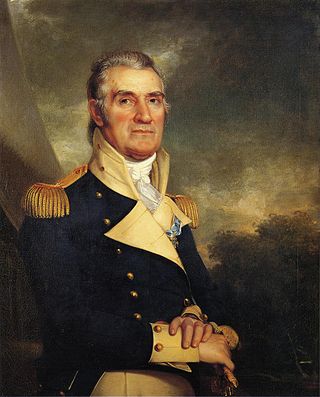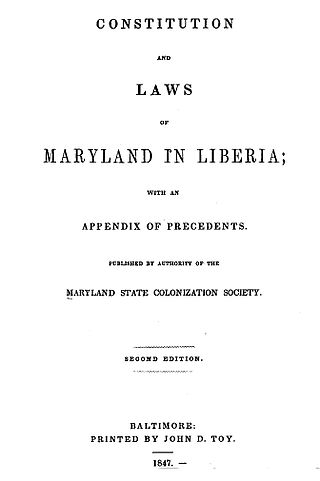Related Research Articles

The flag of Liberia or the Liberian flag, sometimes called the Lone Star, bears a close resemblance to the flag of the United States, representing Liberia's founding by former black slaves from the United States and the Caribbean. They are both part of the stars and stripes flag family.

The American Colonization Society (ACS), initially the Society for the Colonization of Free People of Color of America, was an American organization founded in 1816 by Robert Finley to encourage and support the repatriation of freeborn people of color and emancipated slaves to the continent of Africa. It was modeled on an earlier British colonization in Africa, which had sought to resettle London's "black poor".

Jehudi Ashmun was an American religious leader and social reformer from New England who helped lead efforts by the American Colonization Society to "repatriate" African Americans to a colony in West Africa. It founded the colony of Liberia in West Africa as a place to resettle free people of color from the United States.
Ralph Randolph Gurley was an American clergyman, an advocate of the separation of the races, and a major force for 50 years in the American Colonization Society. It offered passage to free black Americans to the ACS colony in west Africa. It bought land from chiefs of the indigenous Africans. Because of his influence in fundraising and education about the ACS, Gurley is considered one of the founders of Liberia, which he named.

Samuel Smith was an American Senator and Representative from Maryland, a mayor of Baltimore, Maryland, and a general in the Maryland militia. He was the older brother of cabinet secretary Robert Smith.

The Republic of Maryland was a country in West Africa that existed from 1834 to 1857, when it was merged into what is now Liberia. The area was first settled in 1834 by freed African-American slaves and freeborn African Americans primarily from the U.S. state of Maryland, under the auspices of the Maryland State Colonization Society.

Lott Cary was an African-American Baptist minister and lay physician who was a missionary leader in the founding of the colony of Liberia on the west coast of Africa in the 1820s. He founded the first Baptist church in 1822, now known as Providence Baptist Church of Monrovia. He served as the colony's acting governor from August 1828 to his death in November that year.
A number of colonization societies which promoted the migration of African Americans to Africa have existed in the United States. Thomas Jefferson was a Founding Father who promoted the racial separation of Native Americans and the colonization of African Americans to places far away from Virginia. Jefferson was the most important early advocate of colonization. The Reverend Samuel Hopkins of Newport appears to have originated the idea of colonization in 1770.

Edward Wilmot Blyden was an Americo-Liberian educator, writer, diplomat, and politician who was primarily active in West Africa. Born in the Danish West Indies, he joined the waves of black immigrants from the Americas who migrated to Liberia. Blyden became a teacher for five years in the British West African colony of Sierra Leone in the early twentieth century. His major writing were on pan-Africanism which later became influential throughout West Africa, attracting attention in countries such as the United States as well. His ideas went on to influence the likes of Marcus Garvey, George Padmore and Kwame Nkrumah.
Elijah Johnson was an African American who was one of the first colonial agents of the American Colonization Society in what later became Liberia. He was probably born in New Jersey and received some limited schooling in New Jersey and New York. He served as a soldier in the War of 1812 and studied for the Methodist ministry. In 1835 he led a company of 120 armed volunteers from Monrovia on a punitive expedition to engage King Joe as a result of the Port Cresson massacre. His son Hilary R. W. Johnson was elected in 1884 as President of Liberia, the first to have been born in the country.
Hilary Teague, sometimes written as Hilary Teage, was a Liberian merchant, journalist, and politician in the early years of the West African nation of Liberia. A native of the state of Virginia in the United States, he was known for his oratory skills and was prominent in early Liberian colonial politics. A leading advocate for Liberian independence from the American Colonization Society, he drafted the Liberian Declaration of Independence in 1847, serving as both a senator and the first Secretary of State for the new nation in the years that followed.

The Maryland State Colonization Society was the Maryland branch of the American Colonization Society, an organization founded in 1816 with the purpose of returning free African Americans to what many Southerners considered greater freedom in Africa. The ACS helped to found the colony of Liberia in 1821–22, as a place for freedmen. The Maryland State Colonization Society was responsible for founding the Republic of Maryland in West Africa, a short lived independent state that in 1857 was annexed by Liberia. The goal of the society was "to be a remedy for slavery", such that "slavery would cease in the state by the full consent of those interested", but this end was never achieved, and it would take the outbreak of the Civil War to bring slavery to an end in Maryland.

Slavery in Maryland lasted over 200 years, from its beginnings in 1642 when the first Africans were brought as slaves to St. Mary's City, to its end after the Civil War. While Maryland developed similarly to neighboring Virginia, slavery declined in Maryland as an institution earlier, and it had the largest free black population by 1860 of any state. The early settlements and population centers of the province tended to cluster around the rivers and other waterways that empty into the Chesapeake Bay. Maryland planters cultivated tobacco as the chief commodity crop, as the market for cash crops was strong in Europe. Tobacco was labor-intensive in both cultivation and processing, and planters struggled to manage workers as tobacco prices declined in the late 17th century, even as farms became larger and more efficient. At first, indentured servants from England supplied much of the necessary labor but, as England's economy improved, fewer came to the colonies. Maryland colonists turned to importing indentured and enslaved Africans to satisfy the labor demand.
Nathaniel Brander (1796–?) was an Americo-Liberian politician and jurist who served as the first vice president of Liberia from 1848 to 1850 under President Joseph Jenkins Roberts.
Anthony David Williams (1799-1860) was a Liberian politician who served as the second vice president of Liberia from 1850 to 1854 under President Joseph Jenkins Roberts. Born free in the United States in 1799, he immigrated as a Methodist preacher from Petersburg, Virginia to Liberia in 1823. Williams served as the Colonial Agent for the American Colonization Society from 1837 to 1839. During his tenure, the colony of Mississippi-in-Africa was established. In the 1849 elections, Williams ran for vice president against incumbent Nathaniel Brander. The failure of any candidate to secure a majority of the vote led the race to be thrown to the House of Representatives, which chose Williams as vice president. He died in 1860.

Settler colonialism occurs when colonizers and settlers invade and occupy territory to permanently replace the existing society with the society of the colonizers.
Colonel Henry Dundas Campbell was a British professional soldier, Governor of Sierra Leone from 1835 to 1837. Campbell's mona monkey was named after him, in 1838, by George Robert Waterhouse.

Ann Randolph Meade Page was an American Episcopal slavery reformer. She was raised in her birth family with slaves and her husband was among the largest slaveholders in Frederick County, Virginia. She did not believe in slavery, and while she was unable to free slaves, she focused on improving their conditions by teaching them to read and write, Christianity, a wide range of domestic skills and trades. After the founding of the American Colonization Society and, after the death of her husband, she emancipated enslaved people and prepared them to leave the United States for the colony of Liberia in West Africa, where they and their family members would live free.
Jacob W. Prout (1804–1849) was a Liberian politician and physician. He served as the secretary of the 1847 constitutional convention.
James Washington Lugenbeel was an American physician, who worked for the American Colonization Society. He served as colonial physician in Liberia as well as an agent for the United States government. Lugenbeel's account of the 1847 Liberian constitutional convention in his journal became the only known record of the convention's proceedings.
References
- ↑ "The African Repository and Colonial Journal (periodical)". University of Kentucky . Retrieved September 6, 2022.
- ↑ "Ralph Randolph Gurley". Encyclopedia Britannica . Retrieved November 19, 2022.